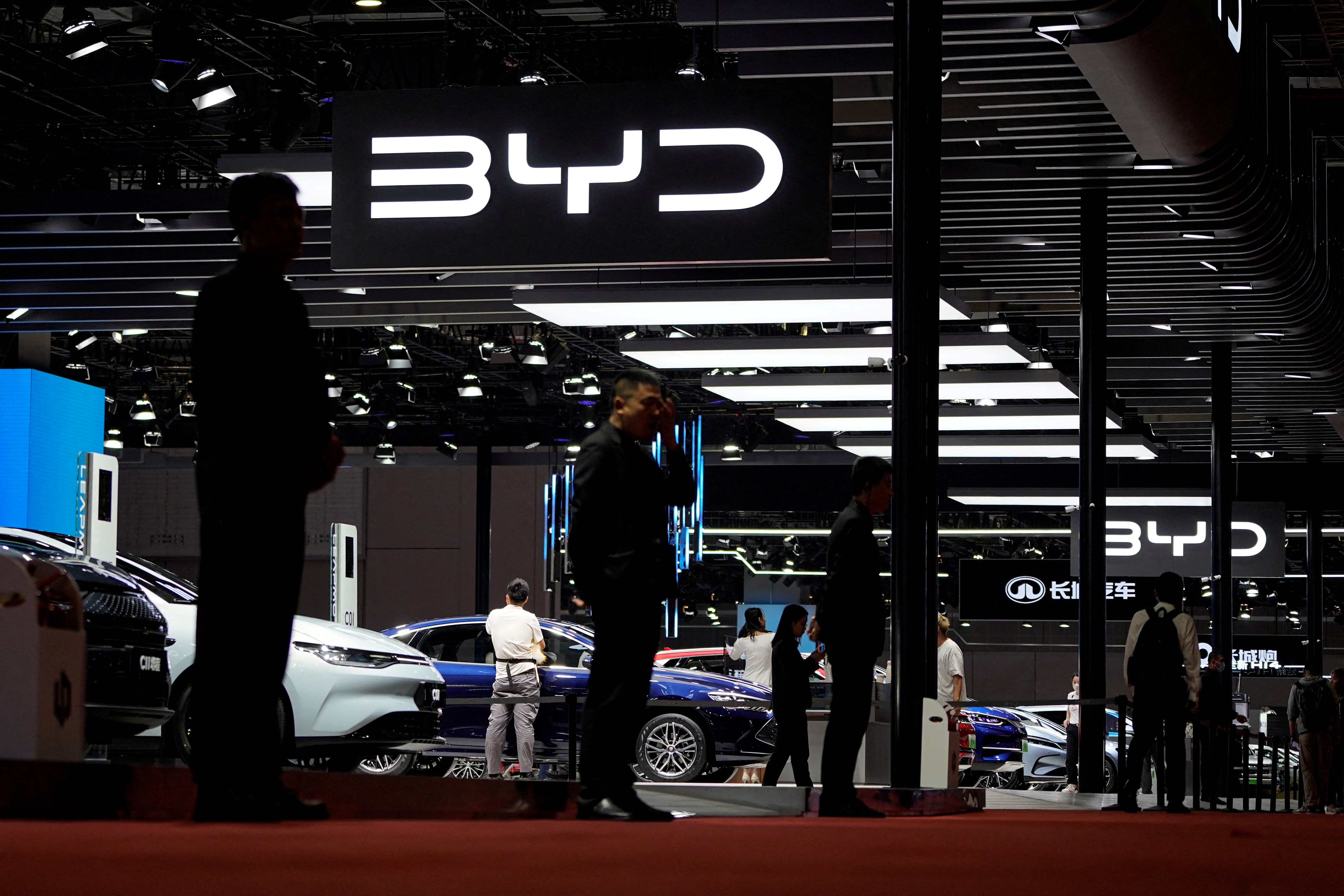
FILE PHOTO-Security guards stand at the BYD booth at the Auto Shanghai show, in Shanghai, China April 19, 2023. REUTERS/Aly Song/file photo Acquire Licensing Rights
Aug 28 (Reuters) – Chinese automaker BYD (002594.SZ) said on Monday its electronics unit has struck a deal with U.S.-based manufacturer Jabil Inc (JBL.N) to buy its mobile electronics manufacturing business in China for 15.8 billion yuan ($2.2 billion).
The deal will expand BYD Electronic’s (BE) (0285.HK) customer base, product portfolio and its smartphone components business as it looks to capture Jabil’s potential growth in the sector.
Singapore-based Jabil Circuit, which manufactures printed circuit boards, established a unit this month that absorbed its product-manufacturing businesses in Chengdu and Wuxi, which will now be sold to the Chinese group.
Shares of Jabil rose 6% to $109.50 in early trading.
BYD Electronic’s shares initially fell as much as 9% in Hong Kong, but reversed their losses and closed flat, while the broader market ended 1% higher. The Hong Kong-listed stock of its parent, BYD (1211.HK), closed 0.7% up.
Although now best known for its electric vehicle business, BYD started out by selling electronic components. In 2007, it listed its BE unit on the Hong Kong Stock Exchange.
BE’s major business has been selling electronic components for consumer electronics products such as smartphones and laptops. This was one of three key business segments for BYD Electronic, accounting for more than 70% of its total revenue in 2022.
“For BYD, I think it’s a reminder that they do more than just dominate in EVs,” said Tu Le, founder of consultancy Sino Auto Insights, adding that they were higher up in the mobile supply chain and were a supplier to Apple Inc (AAPL.O).
Citi analysts said in a note that they believed the deal involved Jabil’s Green Point metal casing operations in Wuxi, and that it could see BE further penetrating into Apple’s casing supply with higher market share.
BE will likely have to fund the acquisition with loan and equity issuance, they added.
BYD and BE did not disclose how they planned to finance the deal.
BE did not immediately respond to requests for further comment.
“While improving BE’s market share of products, the acquisition will effectively synergize with BE’s existing products, enhance the overall competitiveness, ensure long-term sustainable development,” BYD said in an exchange filing, without divulging any further details about the acquisition.
If the deal is completed, the definitive agreement would enable Jabil to “enhance our shareholder-centric capital framework, including incremental share buybacks”, Chief Executive Kenny Wilson said in a statement.
The deal would allow Jabil to further invest in “electric vehicles, renewable energy, healthcare, AI cloud data centers, and other end-markets,” Wilson added.
UBS Research analysts said Jabil’s board has been focused on addressing the “lack of growth” at its mobile parts business.
The deal could streamline Jabil’s portfolio at a time the company’s business from key customer Apple has been steadily declining, down from 28% of fiscal 2018 revenue to just 19% in fiscal 2022, according to UBS analysts.
Jabil Circuit works with companies in healthcare, telecommunications, computing and storage, with an aim to drive supply-chain intelligence, according to its website.
BYD first entered the car industry in 2003 when it acquired Nanjing-based automaker Qin Chuan, which held a permit for car manufacturing.
($1 = 7.2890 Chinese yuan)
Reporting by Sameer Manekar in Bengaluru and Yelin Mo in Beijing; Additional reporting by Brenda Goh in Shanghai and Jaspreet Singh in Bengaluru; Editing by Stephen Coates, Mike Harrison and Shinjini Ganguli
: .

